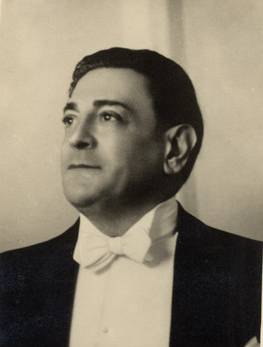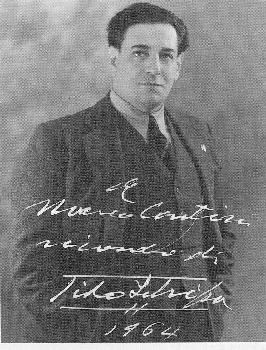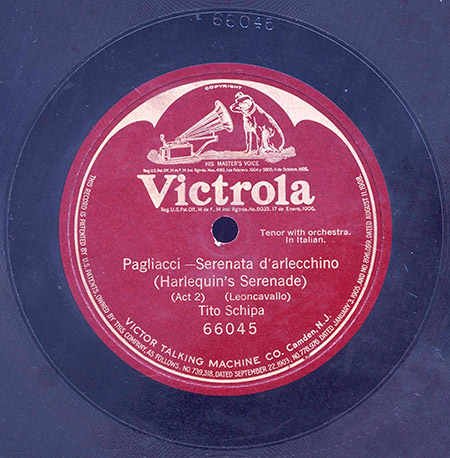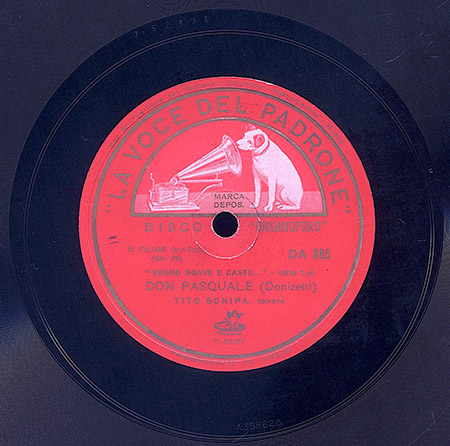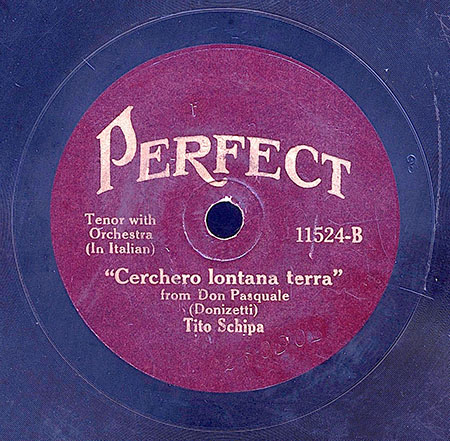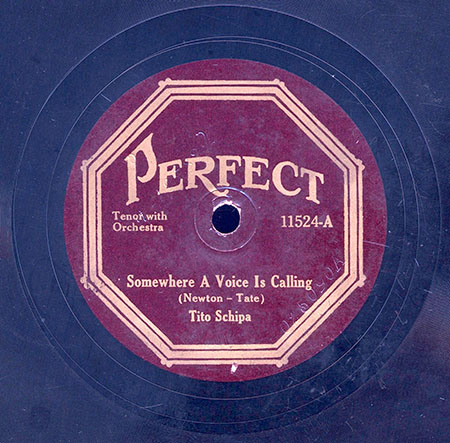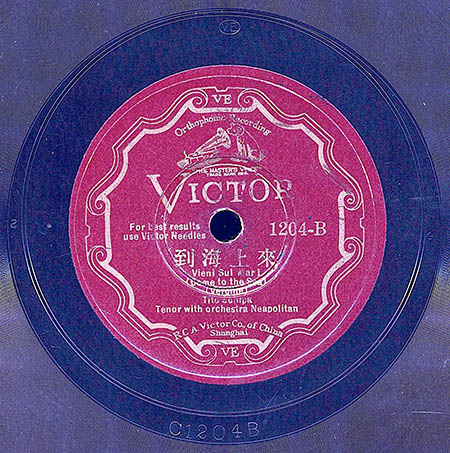Tito Schipa
I wish to thank Thomas Silverbörg for the picture.
I would like to thank Thomas Silverbörg for the recording (O del mio amato ben).Tito Schipa was very probably the single best tenor of all times, in terms of vocal technique and musicality; certainly not in terms of vocal splendor. His voice was veiled, initially very very small (although his stunning technique easily overcame that obstacle), he had no high C, and a timbre that one would be hard-pressed to describe as beautiful by nature – and yet his vocal wisdom enabled him to produce a sound so seductive that most listeners would swear to listen to a beautiful voice. He was also an extremely lyrical tenor, the typical tenore di grazia; but once again, his larger-than-life technique made it possible that he sang roles far beyond the tenore di grazia repertory, and so exceedingly well that most tenors with far better suited voices could not hold a candle to him. That's particularly true of his Werther; where many a dramatic tenor shouts and blares until sorely failing at the latest in the third (but mostly already in the second) act, Schipa outdoes them all with musical intelligence, style, nobility – and in spite of a voice with which it would seem pathetic to even try Werther, in theory. In reality, he was the greatest Werther ever, and everybody else (even Kozlovskyj and Piccaver, who were great exponents of the role beyond doubt) appears like a Werther apprentice in comparison. Born Raffaele Schipa into an albëreshë family (that's the Albanian minority in the south-east Italian region of Puglia), Titu (Puglian dialect for "shorty") was his nickname, and so he became Tito Schipa in art. Already at age 14, he started studying composition and soon also voice, with Alceste Gerunda in Lecce, and subsequently with Emilio Piccoli in Milano. He made his debut on February 4th, 1909 in Vercelli as Alfredo. In 1913, he was abroad for the first time (Buenos Aires and, above all, Rio de Janeiro, where he would return regularly until 1941); in 1914, he had his first major success in Italy, as Cavaradossi in Naples. In 1917, he sang Ruggero in the world premiere of La rondine in Monte Carlo. In 1918, he scored a triumph in Manon in Madrid. From 1919 to 1932, he lived and sang in Chicago, then he went to the New York Met, where he took over from Beniamino Gigli, who had returned to Italy. Schipa did the same, in 1935 (although he was back to the Met for several performances in 1941). In Italy, he was closely associated with the Fascist regime, which led to his ban from the US stages and even from La Scala after the war. With considerable effort, he dissociated himself from fascism, and from his own political conduct, and his career recovered. He appeared on stage until 1958, and in concert up to his death. Other than a tenor, he was also a composer, and made several movies in Italy. Beniamino Gigli once said: "When Tito Schipa sings, all of us have to bow to his greatness." La traviata – Vercelli, 4 February 1909 Adriana Lecouvreur – Crema, 26? December 1909 Zazà – Crema, 8? January 1910 Mignon – Lecce, April 1910 Mefistofele – Lecce, May 1910 Rigoletto – Messina, 24 July 1910 Faust – Bozzolo, August 1910 La bohème – Crema, 4 February 1911 Il barbiere di Siviglia – Pola, 15 May 1911 Don Pasquale – Terni, 20 April 1911 Il maestro di cappella – Terni, 26 April 1911 Werther – Roma, 17 July 1911 Fedora – Roma, 14 August 1911 La sonnambula – Roma, 1 September 1911 Cavalleria rusticana – Roma, 29 September 1911 Fra Diavolo – Catania, 21 November 1911 Antony – Parma, 14 April 1912 Lucia di Lammermoor – Trieste, 25 May 1912 La favorite – Trieste, 31 August 1912 Tosca – Palermo, 8 November 1912 Falstaff – Napoli, 26 December 1913 Madama Butterfly – Napoli, 26 March 1914 Marcella – Napoli, 3 April 1914 Manon – Buenos Aires, 19 June 1914 Le donne curiose – Napoli, 25 March 1915 Ivan – Roma, 13 April 1916 L'ultima gavotta – Montevideo, 25 August 1916 L'elisir d'amore – Barcelona, 14 December 1916 Lakmé – Madrid, 27 January 1917 La rondine – Monte Carlo, 27 March 1917 Jugar con fuego – Madrid, 15 February 1918 Manole – Monte Carlo, 17 March 1918 Il barbiere di Siviglia (Paisiello) – 1918 La bruja – Madrid, 29 January 1919 L'amico Fritz – Napoli, 22 March 1919 Lodoletta – Napoli, 2 April 1919 Linda di Chamounix – Chicago, 5 January 1921 Il viandante – Havana, 7 June 1921 Martha – Chicago, 11 January 1923 Roméo et Juliette – Chicago, 15 August 1923 Sadko – Buenos Aires, 1 August 1930 La principessa Liana – Milano, 1 May 1935 Il matrimonio segreto – Milan, 1 January 1936 L'arlesiana- – Milan, 11 April 1936 Die Zauberflöte – Roma, 16 March 1937 Reference:Tito Schipa Jr. Tito Schipa, Baskerville, 1996 |
